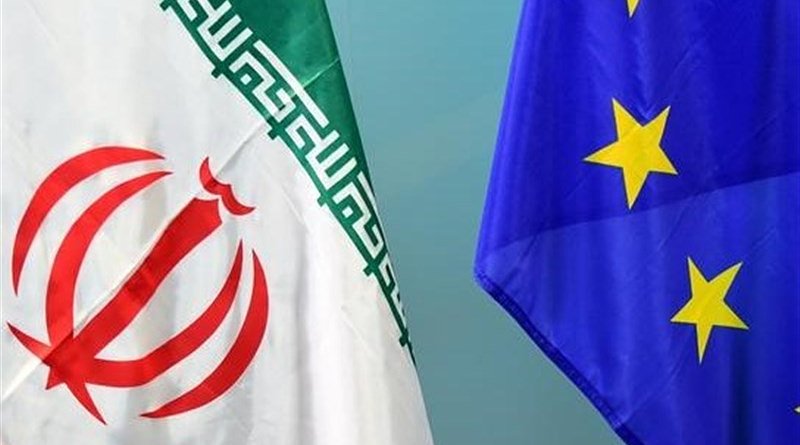EU Willing To Maintain Iran Nuclear Deal, Risking Rift With US
By EurActiv
By Alexandra Brzozowski
(EurActiv) — With the prospects of a potential US-Iran war fading, EU foreign minister during an emergency session on Friday (10 January), said they are willing to maintain the Iran nuclear deal as long as Tehran fulfils its commitments in order to achieve it.
In an attempt to avoid an escalation between Iran and the US, EU leaders in the recent week have intensified diplomatic activities, trying to salvage the EU-brokered nuclear deal while making sure the US-led anti-IS coalition continues to operate in Iraq after Iraq’s parliament called for the withdrawal of all foreign troops from the country.
“The region cannot afford another war, we call for an urgent de-escalation and maximum restraint,” EU’s chief diplomat Josep Borrell told reporters following the meeting in Brussels on Friday, that had reaffirmed European commitments preserving the Joint Comprehensive Plan Of Action (JCPOA).
“We have been saying in the past and we continue to say that we regret the US decision to withdraw from the deal,” Borrell said, “And we continue believing that this deal is a key element of the global nuclear non-proliferation architecture and critical for the regional stability.”
He also warned that negotiating a new pact would be a “very complex, highly technical process” that would take a long time.
Washington’s sanctions policy on Iran is a more effective non-proliferation tool to force Tehran to negotiate a broader accord than the 2015 nuclear deal, US Special Representative for Iran, Brian Hook, told reporters in a conference call on Friday (10 January).
“Iran can never acquire a nuclear weapon, it would be catastrophic for the Middle East,” Hook said. “Now that we are outside of the Iran nuclear deal, we are in a much better position to deny Iran a nuclear weapon.
“It allows us to then forcibly respond to Iran’s regional aggression and that is what we have done with our sanctions,” Hook added.
His remarks stood in contrast to those of EU foreign ministers.
“It is clear that we are in a completely different position from the United States,” Borrell told reporters after the meeting.
Borrell also admitted that the potential differences between the treaty parties could at some point become so irreconcilable that they could risk the deal collapsing.
“Maybe we cannot avoid that the JCPOA finally is being cancelled because the dispute mechanism can be triggered and I cannot exclude that this happens,” Borrell said.
Since the Trump administration decided to exit the deal in 2018, all three European parties to the pact – Britain, France and Germany – have repeatedly stressed their commitment to saving it, even after a call by Trump this week urging them to join him in walking away.
One of the contentious points between Europe and Washington has been the Instrument in Support of Trade Exchanges (INSTEX), which was born as the brainchild of France, Germany and the UK in January 2019, and recently joined by further European countries.
It was created as a special purpose vehicle to help EU companies do business with Iran and facilitate non-USD transactions to avoid breaking US sanctions against the country.
European efforts, however, to ensure that Iran can keep trading in spite of the sanctions have had little impact.
The Trump administration on Friday (10 January) imposed new sanctions on Iran, with the latest round set to target multiple sectors of the Islamic Republic’s economy, including construction, manufacturing, textiles and mining.
“This order will have a major impact on the Iranian economy,” President Donald Trump said in a statement earlier this week. “These punishing economic sanctions will remain until the Iranian regime changes its behavior.”
Europeans stand behind the deal
“We are of the opinion that this agreement makes sense, because it holds Iran to not developing nuclear weapons, and so we want this agreement to have a future,” Germany’s foreign minister Heiko Maas said upon arrival at the meeting. “But of course, it only has a future if it is complied with, and we expect that from Iran.”
Earlier Friday, French Foreign Minister Jean-Yves Le Drian warned that without action, Iran could soon be in a position to develop a nuclear bomb.
“If they continue to unravel the Vienna accord then yes in quite a short period, between one and two years, they could have a nuclear weapon, which is unimaginable,” he told France’s RTL radio.
Both, France and Germany have warned for some time that unless Iran returns to full compliance with the terms of the deal, they may trigger the dispute mechanism.
Several other ministers support the EU’s continuing determination to preserve the deal, which they say is vital for non-proliferation and regional security, but are expected to wait for UN inspectors to monitor and verify Iran’s activities and report on developments on the ground before discussing further steps.
Borrell has invited Iranian Foreign Minister Mohamed Javad Zarif for talks to Brussels, but a date for his visit has yet to be set.
European also expressed concerns that the escalating tensions in the region could lead to a resurgence of IS.
“We need to understand that the fight against ISIS is not over,” NATO Secretary-General Jens Stoltenberg, who briefed EU ministers on the security situation across the region, said after the meeting. “We have made enormous progress, but Daesh can return.”

